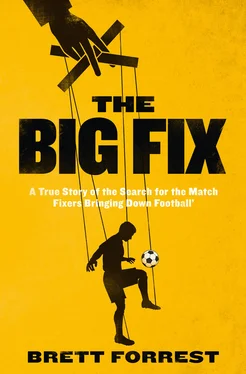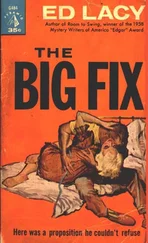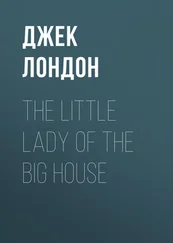In Atlanta, they blended in with all the other tourists who were there for the 1996 Olympics. They hung around the hotels, the stadiums, and practice fields where they might encounter players for the sixteen national teams included in the football tournament. Olympic football was a jerry-rigged competition that FIFA tolerated, so long as it wouldn’t infringe on the popularity of the World Cup. After limitations on players’ ages and levels of experience diluted the rosters, the result was a marginalized round-robin that hardly did justice to an Olympic competition of the world’s most popular game.
All the same, the betting on the Olympics football tournament would be worth the effort that Kurusamy and Perumal put into manipulating it. Five different cities in the eastern United States hosted the Olympics football competition. Kurusamy and Perumal traveled to one of the venues – Legion Field in Birmingham, Alabama. There, according to Perumal, they approached Mexico’s goalkeeper, Jorge Campos, one of the most well-known players in the international game. The Singaporeans attempted to corrupt Campos, but he turned them down.
A partner of Kurusamy, a middle-aged man whom Perumal knew only as “Uncle,” had made contact with players from another national team before the games started. He claimed to have struck a deal with the team’s defenders and goalie. Perumal couldn’t be sure, but it appeared to him on seeing their results that Uncle wasn’t exaggerating his influence over the team.
It was Perumal’s first taste of success while abroad. He saw how it might be done, how you could approach national team players, how willing they were likely to be. And when he returned to Singapore, Perumal wished he had simply stayed in America.
Singaporean police had issued another warrant for his arrest. He spent the night in lockup at the CPIB holding pen. The following day, as officers escorted him to a car on the police grounds, Perumal slipped one of his handcuffs and ran for it. He tried to scale a fence, but it was too high, and the officers dragged him back to the ground. At court, a judge sent him down for two years – plus extra time for attempting to escape custody. Police also picked up Kurusamy. The Boss ended up spending two years in solitary confinement.
When Perumal was released, in 2000, while those around him were excited about the prospects of the new millennium, his hopes were dim. He was thirty-five years old, a convicted felon with no professional skills, no references, and no viable financial prospects. There was only one thing he had ever known how to do. And his time in prison, where he shared a small cell with a dozen men, where a small bowl served as his toilet and his drinking cup, this period had not caused him to develop his talents.
When Perumal consulted the schedule and noticed that a match between two S. League teams was a few days off, he got an idea. There was still too much heat on fixing. Perumal didn’t trust the players. They were liable to turn him in, notifying the CPIB to save themselves. But there were other ways to influence the outcome of a match.
The strongest player for the Woodlands Wellington club was a Croatian import, a midfielder named Ivica Raguz. Perumal had watched enough Wellington matches to understand that the team’s chances were largely dependent on Raguz’s performance. If Raguz happened to miss a game, and if Perumal happened to possess this knowledge before a bookmaker knew that Raguz was going to sit it out, Perumal stood to gain. Perumal had always considered match-fixing a victimless crime. The only people who got burned were the bookies, and they were dealing in such high volume that, Perumal rationalized, his manner of fraud made little impact. Perumal had developed a philosophy by which he was the patron of football’s lost souls, the financial champion of players whom the establishment paid less than a living wage. Perumal was the one who augmented their salaries, made their lives possible. Financial desperation may have altered his character. Maybe it was prison. Or maybe the elaborate stories that he was telling himself and others were the convoluted justifications of someone who would indeed do anything to beat the system.
Perumal hired two Bangladeshi men to assault Ivica Raguz before Wellington’s next match, against Geylang United. Perumal and a friend placed a bet, 30,000 Singapore dollars, on Wellington’s opponent to win. Then they sat back and waited to hear from the Bangladeshis. But the call from the Bangladeshis, confirming that they had incapacitated Raguz, never came. Raguz was a large, heavily muscled man, and when the Bangladeshis saw him in person, they froze. They decided this job wasn’t for them. But the bet had already been placed. Perumal had to do something. He had to do the job himself. With money on the line, and a crude sort of match-fixing proposed, Perumal proved his industry.
He lay in wait in a stand of bushes near the Lower Seletar Reservoir, in northern Singapore, where Wellington’s practice field was located. Perumal held a field hockey stick in his hand. He waited for some time before Raguz appeared. When Raguz did materialize, a teammate was by his side. This was Perumal’s chance to abandon his plan. He hadn’t yet crossed over from fraud to felony assault. His victims showed no visible bruises. He hadn’t threatened anyone’s health or livelihood. But desperation outweighed all concerns. Perumal didn’t want to miss the chance. He stepped out of the bushes, approaching the men from behind. He swung his field hockey stick, striking Raguz on the knee with the dull, hard wood. Raguz and his teammate managed to escape, but the damage was done. Raguz didn’t play against Geylang United, and the bet came off.
Perumal had little time to enjoy his winnings. A few days after the match, police arrested him on assault charges. He spent another year in prison.
When he was released, in September 2001, Perumal kept to himself. He felt like a pariah. He kept away from the few friends who continued to associate with him. Fixing was off-limits, even if he had wanted to revive his connections in that world. But he had to earn a living somehow. Regular work was not an option for Perumal. He had never held a traditional job. With his criminal record, he would not have been able to find honest work that equaled his conception of himself. Instead, he opted for credit card fraud. Match-fixing had earned Perumal fairly light sentences – six months, a year. Considering fixing’s financial potential, the risk of such limited prison time seemed worth the gamble. However, institutional financial crime was serious business in Singapore. When the bank that Perumal targeted traced the source of the fraud, it was easy to identify the perpetrator.
Perumal was too poor to hire an attorney, and he instead represented himself at trial. Because of Perumal’s previous escape attempts, the judge ordered him to wear handcuffs in court. It was humiliating. And inevitable. Perumal wasn’t surprised when he was convicted of fraud. He understood the evidence. He also figured that his days as a match-fixer were over. He had already begun to conceive of how he was going to make a living when he got out of prison. But all of this thinking stopped, as he was staggered to learn of the penalty he would have to pay. When the judge pronounced a judgment of four years, Perumal wanted to hide his face in his hands. But he couldn’t, since he was shackled.
Chris Eaton was at the wheel of his Ford Fairmont. The headlights up ahead belonged to a refrigeration truck that was crossing over into his lane. Eaton had little time to react. Instinctively, he swerved to the right. Eaton was driving in the left lane, as is the way in Australia, in a right-hand-drive car. A simple twist of the steering wheel. Debbie, mercifully asleep against her pillow, accepted the force of the collision. Everything transpired at highway speed.
Читать дальше











